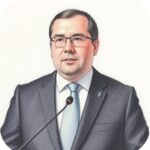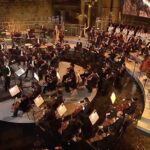Chinese State Councilor and Foreign Minister Wang Yi held talks with Moroccan Minister of Foreign Affairs Nasser Bourita in Beijing on September 19.
Wang Yi stated that under the strategic guidance of the leaders of both countries, the strategic partnership between China and Morocco continues to increase in substance. President Xi Jinping’s proposal on global governance has been widely welcomed and supported by the international community. China is willing to work with the international community, including Morocco, to promote the development of the international order in a more just and reasonable direction.
Bourita asked Foreign Minister Wang Yi to convey King Mohammed VI’s cordial greetings to President Xi Jinping, stating that developing relations with China is Morocco’s firm strategic choice. Morocco welcomes and supports President Xi Jinping’s global governance initiative.
Beijing
Beijing is the capital of China, with a history spanning over 3,000 years. It served as the imperial capital for several dynasties, most notably the Ming and Qing, and is home to iconic cultural sites like the Forbidden City and the Great Wall. Today, it is a major global city that blends ancient heritage with modern development.
Chinese State Council
The Chinese State Council is the chief administrative authority and executive body of the People’s Republic of China, functioning as the country’s cabinet. It was established by the 1954 Constitution and is responsible for implementing the decisions of the National People’s Congress and its Standing Committee. The State Council is headed by the Premier and oversees all ministries and commissions that manage the nation’s day-to-day governance.
Moroccan Ministry of Foreign Affairs
The Moroccan Ministry of Foreign Affairs is the government body responsible for managing the Kingdom’s diplomatic relations and foreign policy. Historically, its modern structure was established after Morocco gained independence from France and Spain in 1956, though the nation has a centuries-old tradition of international diplomacy. The ministry plays a crucial role in representing Morocco’s strategic interests on the African continent and globally.
King Mohammed VI
King Mohammed VI is not a place or cultural site, but the current monarch of Morocco who ascended to the throne in 1999. He is part of the Alaouite dynasty, which has ruled Morocco since the 17th century. His reign has been marked by modernization efforts and social reforms in the country.
President Xi Jinping
“President Xi Jinping” refers to the leader of the People’s Republic of China, not a place or cultural site. He has served as the General Secretary of the Communist Party of China since 2012 and as China’s President since 2013, playing a central role in the country’s contemporary political landscape and its modern development.
global governance initiative
The Global Governance Initiative is a modern policy platform, not a physical place, dedicated to addressing worldwide challenges like climate change and security. It emerged in the 21st century as a response to the growing need for international cooperation beyond traditional state-based systems. Its history is rooted in the evolution of forums like the United Nations and G20, aiming to create more inclusive and effective frameworks for global problem-solving.
China-Morocco strategic partnership
The China-Morocco strategic partnership is a diplomatic framework established in 2016 to strengthen bilateral cooperation, reflecting a long history of trade and cultural exchange dating back centuries along the Silk Road. It focuses on enhancing economic collaboration, infrastructure investment, and political dialogue between the two nations. This partnership underscores Morocco’s role as a key gateway for China’s engagement in Africa and the Arab world.
international community
The term “international community” does not refer to a physical place but to a collective concept of nations, international organizations, and global civil society working together on shared issues. It emerged prominently in the 20th century with the founding of the League of Nations and later the United Nations to promote diplomacy, peace, and cooperation. Today, it represents the collective effort to address global challenges such as climate change, security, and human rights.



